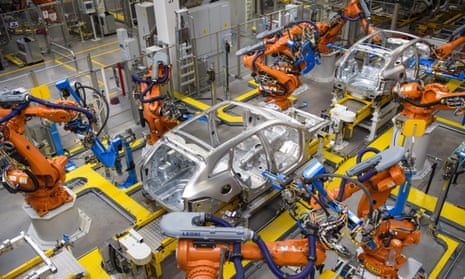Tata Group, the owner of Jaguar Land Rover, has announced it will invest £4bn to build an electric car battery gigafactory in the UK, in a major boost to the British automotive industry.
The factory is expected to be sited in Somerset and to bring 4,000 new jobs to the area. It will become one of Europe’s largest battery cell manufacturing sites when it starts production in 2026, said Tata Sons, the holding company behind the Indian conglomerate.
Tata had been locked in negotiations for nine months to secure state aid for the project, which would aim to produce 40 gigawatt hours (GWh) of batteries a year, enough to power hundreds of thousands of electric cars.
The energy security secretary, Grant Shapps, said commercial sensitivities meant he could not yet declare what subsidies the factory is expected to receive, but an official who worked on the deal said they were worth hundreds of millions of pounds, and as much as £500m.
Natarajan Chandrasekaran, chair of Tata Sons, said: “Our multibillion-pound investment will bring state-of-the-art technology to the country, helping to power the automotive sector’s transition to electric mobility, anchored by our own business, JLR.
“With this strategic investment, the Tata Group further strengthens its commitment to the UK, alongside our many companies operating here across technology, consumer, hospitality, steel, chemicals and automotive.”
Tata had also considered a site in Spain for the plant.
The only other planned battery plant at gigafactory scale in the UK is the Envision plant in Sunderland, which is owned by a Chinese corporation and supplies Nissan. Envision plans to expand its site to produce 38GWh.
The prime minister, Rishi Sunak, said: “Tata Group’s multibillion-pound investment in a new battery factory in the UK is testament to the strength of our car manufacturing industry and its skilled workers.
“With the global transition to zero emission vehicles well under way, this will help grow our economy by driving forward our lead in battery technology while creating as many as 4,000 jobs, and thousands more in the supply chain.
“We can be incredibly proud that Britain has been chosen as home to Tata Group’s first gigafactory outside India, securing our place as one of the most attractive places to build electric vehicles.”
The failure of Britishvolt, a gigafactory startup that collapsed after securing pledges of £100m in government support, has cast a shadow over the future of carmaking in Britain.
The two gigafactories will help the UK attract investment and new jobs in other parts of the battery supply chain, to replace tens of thousands of roles that are likely to disappear as production of petrol and diesel vehicles is wound down before the ban on new fossil fuel cars in 2035.
On Tuesday night, Jonathan Reynolds, Labour’s shadow business secretary, “warmly welcomed” the expected deal, saying on Twitter that it “shows the strength of the UK automotive industry”. But…
2023-07-19 02:18:09
Post from www.theguardian.com
















